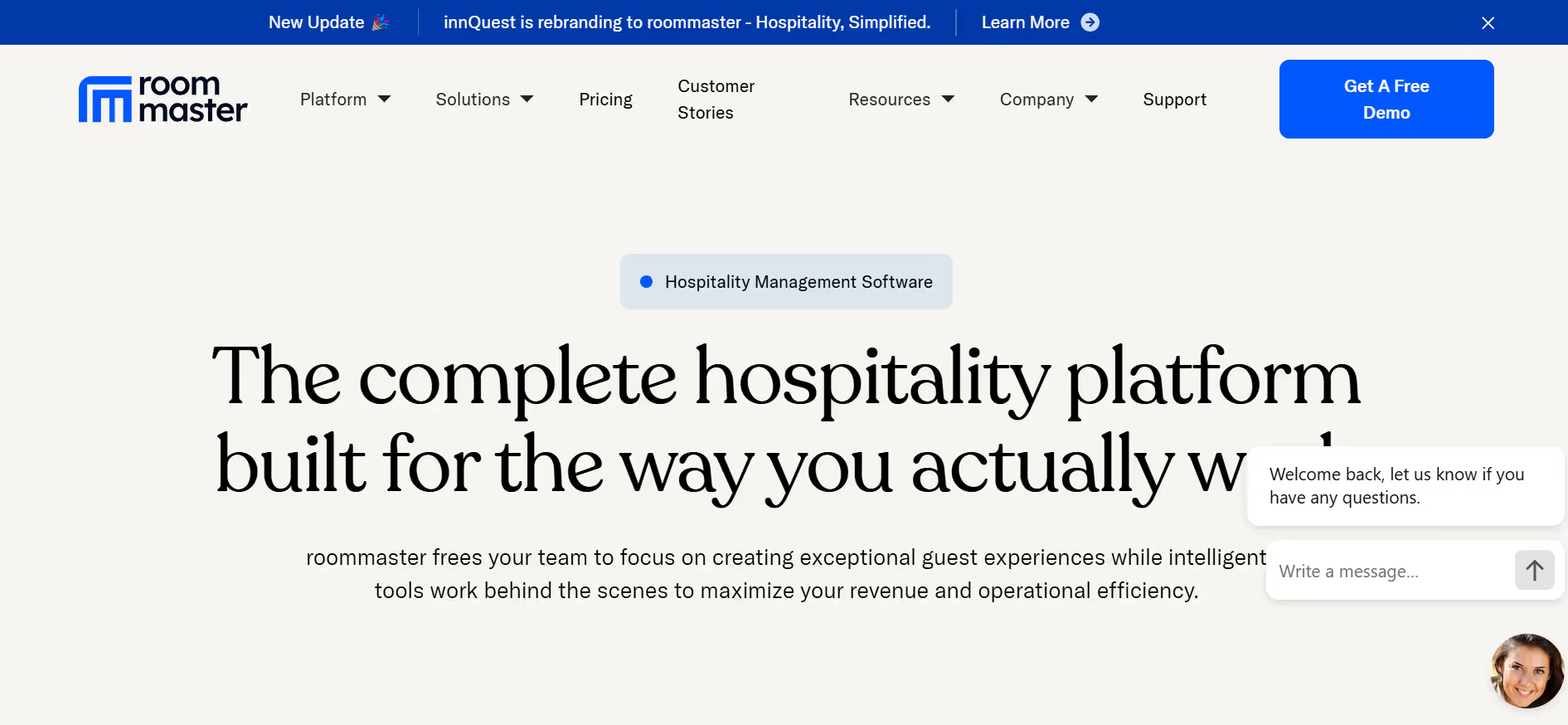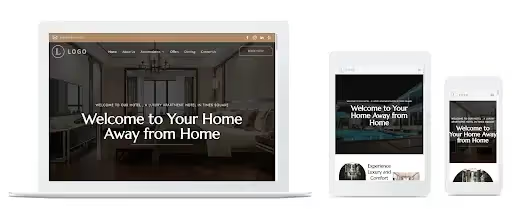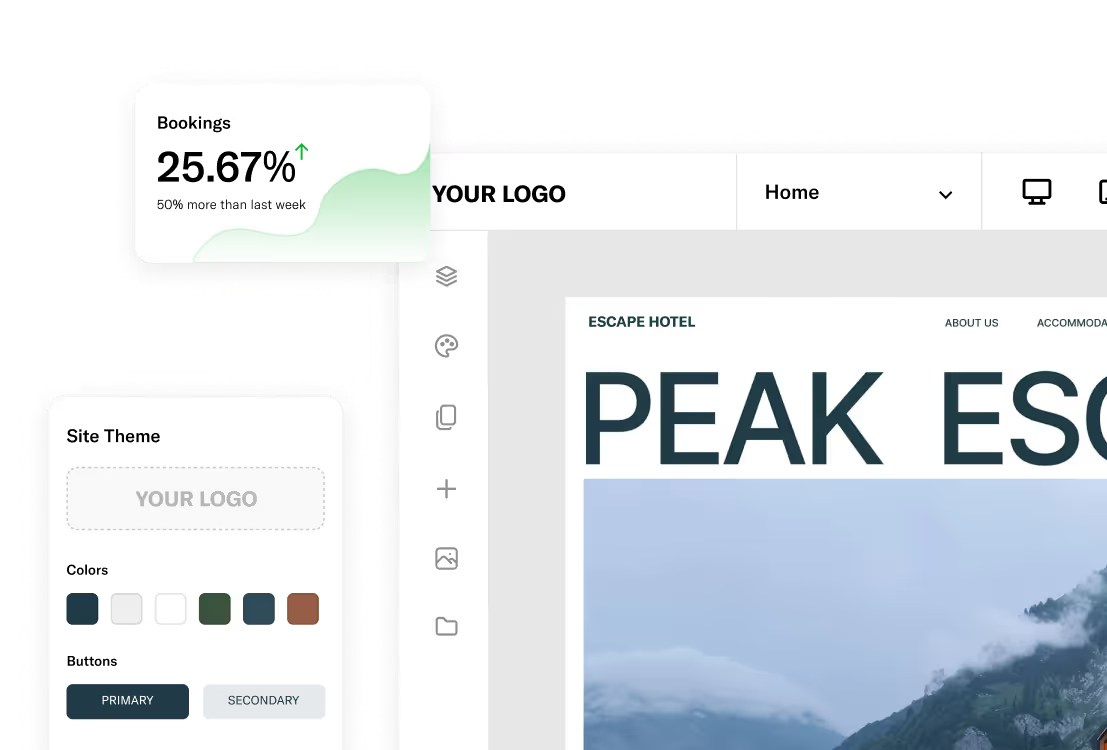Table of Contents
Join Thousands of Hotels Thriving with roommaster
The transition to roommaster is straightforward and efficient. Our implementation team handles data migration including reservations, guest profiles, and historical information.
Building a strong website for your hotel matters just as much as welcoming guests at the front desk. A few years ago, travelers often decided how they felt about a hotel only after walking through the door. That’s no longer the case, because today, their first impression forms the moment your homepage loads.
Your website should clearly answer the questions every guest asks before booking:
If visitors can’t find answers fast, they’ll move on to a competitor. With the best hotel website builder, you can launch a modern, easy-to-manage site that matches your branding, connects to your hotel booking engine, and helps you capture more direct reservations without technical stress. With the right hospitality management software supporting your website, your operations, bookings, and guest interactions stay perfectly aligned from the moment visitors reach your homepage.
In this guide, we’ll walk through the steps needed to create a professional hotel website that doesn’t just look nice but works for your team and your guests. From planning and structure to images and booking tools, we’ll cover what matters most, so your site can work like a second front desk, available 24/7.

Guests often judge your hotel based on your website before they ever consider booking a room. If your site looks outdated, loads slowly, or lacks clear details, many visitors will leave immediately.
A clean, fast, and accurate hotel website design helps you build trust and increase direct bookings reliably. It also lets you control how your brand appears across search engines, mobile devices, and online searches.
Here’s why every hotel needs a website that works well, loads fast, and answers guest questions:
Your professional website gives you complete control over visuals, tone, and messaging, helping shape guest perception from the first click. Plus, you decide what photos show, how amenities appear, and what narrative connects with your ideal audience.
When you control that narrative, you can highlight unique services, local partnerships, or eco-friendly practices without compromise. A strong brand image builds trust, makes your property memorable, and sets guest expectations accurately before they arrive. That leads to fewer disappointments, more positive reviews, and stronger loyalty over time, all while reinforcing your hotel’s identity at every digital touchpoint.
Hotels that drive bookings through their own site earn significantly more revenue per reservation. In 2024, hotels earned about $519 per direct booking through their website compared to $320 from OTAs. That means direct bookings brought in nearly 60% more revenue per reservation without added commission fees.
By 2025, 37% of Americans say they plan to book directly, and nearly a quarter prefer hotel websites. When you push traffic to your own site, you keep more revenue and build stronger guest relationships.
{{hotel-website-builder}}
Your website becomes the primary channel for booking, inquiries, and guest support without waiting times or miscommunication. With it, you can offer live chat or FAQ pages, set up review pages for feedback, and respond quickly to guest concerns in real time.
Immediate response improves satisfaction and encourages positive reviews, which feed back into your marketing. With direct access to guest preferences, nutritional requests, and arrival details, your team can personalize every stay. That level of attentive service increases guest trust and encourages repeat bookings, transforming a stay transaction into a relationship.
A well-structured hotel website gives your property the chance to show up in Google results when people search for places to stay in your area. Without a site, you’re invisible to travelers who prefer to research and book online.
In 2023, 72% of travelers said they preferred booking their trips online, while only 12% chose travel agencies. Speed matters too, as 53% of respondents said online booking is faster, especially for last-minute plans. Another 47% said it’s easier to compare options, and 42% said it helps them find better prices.
A fast, mobile-friendly hotel website makes it easy for search engines to index your content, which directly improves visibility and attracts more organic traffic.
If you want visitors to book directly through your site, your website needs more than basic information. People expect smooth design, fast loading, precise details, and tools that make booking easy.
Below are some of the essential and optional features hotels need to consider:
The essential features form the foundation of a reliable hotel website that guests can trust and use without confusion. Below are some of the most important features:
These optional tools help increase guest interaction, boost content visibility, and give more reasons to book directly.
Think through your goals carefully before uploading photos or choosing any design layout for your website. Hotels that skip this step often build websites that look fine but fail to attract direct bookings.
Hence, start with a goal that matches what your guests need and what your hotel wants to achieve online. Then, use this step-by-step guide to create a hotel website that helps you earn more direct revenue fast.

The first step is to decide what your hotel website should actually achieve once it goes live. You might want to focus on increasing direct bookings, or you might need it to support guest communication with tools like live chat and automated replies. Some properties also use their site to promote event packages or boost local search rankings. The goal you choose affects every design and content decision later.
You also need to understand exactly who your site needs to speak to. A family on a weekend getaway thinks and books differently than a solo business traveler or a couple planning a honeymoon. Start by listing your most common guest types, then write down what each one expects when landing on your homepage:

Your domain name is often the first thing potential guests will see when they find your hotel online. A clear, simple domain gives people confidence and makes it easier for them to remember your property.
Follow these tips when choosing your domain name:
To buy a domain, head to a trusted provider like GoDaddy, Namecheap, or Google Domains. Search for the name you want, check its availability, and register it for at least one year. Many registrars offer domain privacy protection as an add-on, which keeps your contact details hidden from public lookup tools.
Once you register the domain, connect it to your hotel website builder so guests can access your site directly.
Before launching your hotel’s website, you need to decide how you’re going to build it. This choice affects how quickly you can update content, add offers, and connect features like your booking engine or payment gateway. Think about your team’s technical skills and how much time you can realistically spend managing updates.
Use a CMS if:
The roommaster Website Builder offers all of the above, and functions as your CMS, so you can manage content, updates, and key integrations without needing outside tools or extra plugins. With mobile-optimized, professional templates and seamless integration with the roommaster Booking Engine, it helps you attract, engage, and convert direct guests, without relying on outside developers or tools.
{{booking-engine-one}}
You can also use AI-powered content tools to write copy in seconds, built-in SEO features to improve rankings, and automated image optimization to speed up page loads. Everything is fully hosted, supported by roommaster, and backed by 99.95% uptime, so you don’t have to worry about patches, updates, or downtime.
Choose providers that deliver strong performance, tight security, and fast customer support without delay. Leading options like Bluehost, SiteGround, and HostGator offer reliable uptime, fair pricing, and real-time help when problems come up.
Here are the key things to compare before picking a host:
Choosing the right host early on keeps your site stable, fast, and ready for traffic anytime. If you use the roommaster Website Builder, hosting is already included, so you won’t need to purchase or manage a separate hosting plan. Everything runs in one place, fully supported by the roommaster team.
Once you’ve picked your domain and hosting provider, it’s time to bring your hotel website to life. Good design encourages bookings, builds trust, and keeps visitors on your site longer. If the website feels slow or looks outdated, most travelers will leave without booking.
Choose a layout that reflects your hotel’s personality but remains easy to browse. Stick to your brand colors, fonts, and logo across all pages for a consistent look. Place important content, like room details, booking options, and your location, where visitors can find it quickly, preferably on the homepage.
If you’re using a hotel website builder, you can build and update the site yourself using simple drag-and-drop services. These platforms work well for small hotels or owners who prefer to stay hands-on. For more complex needs or advanced features, working with a developer can help avoid technical issues and speed up the process.
To ensure a strong design, focus on:
A polished, easy-to-use site gives guests the confidence to book directly without relying on third-party platforms.

Integrating a powerful booking engine transforms your website into a direct booking tool that drives revenue. The roommaster Booking Engine offers:
In fact, hotels using this system often shift 15 to 30% of bookings from third-party sites to direct bookings, saving on commissions and strengthening guest relationships.
For secure payments, choose gateways like Stripe, PayPal, or roommaster Payments. The roommaster Payments system is explicitly designed for hotels, handling deposits, pre-authorizations, and automated settlements without switching between systems. It stores cards safely and automates reconciliation, saving time and reducing chargeback losses by nearly 40%.
This integration cuts down manual work and offers fast support since it is built by a team focused solely on the hospitality industry needs. To keep your rates and availability accurate across all online travel platforms, connecting your website tools with a hotel channel manager ensures every update stays synced in real time.

To bring visitors to your hotel website without paying for ads, you need to focus on SEO. Start by doing keyword research using tools that show what your potential guests are actually searching for:
Then work on your on-page SEO. Make your website pages relevant and easy to find by search engines:
You also need off-page SEO to build credibility and traffic from outside sources:
A solid SEO plan helps your website show up when people search for hotels. The right content and structure will help searchers turn into guests.
Your website’s visual design needs to reflect your hotel’s personality and build trust instantly. For example, the Mission Inn Hotel & Spa in Riverside, California, uses large, crisp images of its Spanish-Renaissance architecture to draw visitors into its unique ambiance.
Here are design tips that similar independent hotels use effectively:
These design choices help visitors feel welcomed, understand your hotel’s value quickly, and move toward booking with confidence. Let me know if you’d like similar detail on traffic-driving strategies next.
Once your website goes live, tracking performance helps you spot what’s working and what needs fixing. To do that, follow these steps:



Small tests every month can lead to real improvements. Use what your visitors tell you through data and feedback to guide every decision.
A hotel website should help you bring in bookings, showcase your brand, and support guest needs. But many independent hoteliers face two common problems:
The roommaster Website Builder gives you an easy way to launch a professional hotel site without outside help. You can use website templates designed specifically for hotels and customize them to match your unique brand identity. These layouts already follow modern web design practices and include room for images, booking tools, and special offers. Each template is mobile-friendly, fast to load, and easy to edit.

Every site comes with reliable hosting, built-in security, and 99.95% uptime. That means no worrying about downtime, software updates, or server maintenance. You also get SEO tools, AI-powered content tools, and image optimization, so your site loads quickly and ranks higher in search results.
Schedule a call today and see how fast you can launch a hotel website that brings in more guests, without writing a single line of code.
The roommaster Website Builder is the best website hotel builder. It offers built-in booking tools, fast setup, mobile-ready templates, and direct integration with your property management system.
Start by choosing a domain, selecting a hotel website builder, adding rooms, images, and booking options, and then publishing your site. Use SEO and booking tools to attract and convert guests.
Costs range from $0 to $30,000, depending on whether you use DIY builders or hire professionals. roommaster offers affordable, all-in-one plans built specifically for independent hotel websites.
Your own hotel website is best for more direct bookings. Platforms like roommaster let you create fast, mobile-friendly sites that cut commission costs and give you complete control over guest experience.
{{cta-strip}}


The transition to roommaster is straightforward and efficient. Our implementation team handles data migration including reservations, guest profiles, and historical information.
See how roommaster's unified platform can work for your property. Our team will walk you through features tailored to your specific needs and operations.